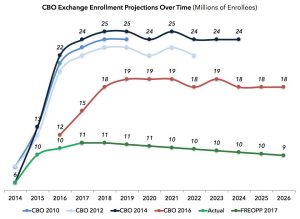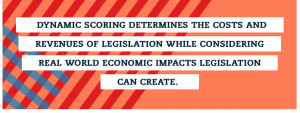
Democrats were doing their happy dance yesterday. The Congressional Budget Office predicted that with the repeal of Obamacare — horrors! The bill would kick 24 million souls off health insurance, including 14 million poor people on Medicaid.
CNN merrily trotted out former CBO director Robert Reischauer — who last held his post under President Clinton — to vouch for the accuracy of the CBO. And in case you think that Mr. Reischauer is coming from an objective perspective, think again. He’s President Emeritus of the Urban Institute. And which way does that think tank lean? Yep, it’s liberal, giving 100% of political donations to the Democratic Party.
Avik Roy at Forbes throws water on the Democrats’ party when he points out that in 2010, when the Affordable Care Act was passed, the CBO was crowing that 21 million Americans would enroll in the exchanges. The truth, however, was something very different. Only about 10 million enrolled. The projections don’t look too promising for Obamacare either.

Furthermore, while this sounds counter-intuitive, it appears that the mandate had little effect on compelling people to buy health insurance. The data simply isn’t there.
Even the notorious Obamacare architect Jonathan Gruber — who smirked about how a “lack of transparency” helped pass the bill — wrote in a 2016 article for the New England Journal of Medicine: “When we assessed the mandate’s detailed provisions, which include income-based penalties for lacking coverage and various specific exemptions from those penalties, we did not find that overall coverage rates responded to these aspects of the law.”

And here’s more examples of how the wizards of smart at the CBO were way, way off in their projections:
So why is the CBO so egregiously wrong?
The answer can be summed up in two words: static scoring.
You’ve heard the truism frequently repeated since the election — elections have consequences. Well, so does legislation. The CBO consistently ignores the fact that everyday people react to new laws. They work around them, when they can, to their advantage. As a result, costs, revenues, and the marketplace change to adapt. The CBO does not factor in this ripple effect.
What would be more accurate is the use of reality-based dynamic scoring. Dynamic scoring takes into account the possible real world impact of legislation.

Republicans have long clamored for the CBO to use dynamic scoring as part of its function. But because using dynamic scoring would lead to more fiscal restraint, guess which party wants to keep the status quo at the CBO?
It works for the Democrats. And that’s why they’re doing their happy dance over probable erroneous projections on health care reform.
While I would be more than happy to grapple with the gruber and slam his wise ass face into the ground, he is just small change. Time to read Unintended Consequences by John Ross.
1 Comment